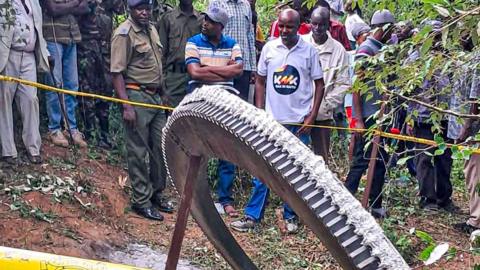"We found a big piece of metal that was very red so we had to wait for it to cool before anyone could approach it," said Ann Kanuna, who told us she owns the land where the object fell.
The giant ring took around two hours to cool down and turn grey – but it had already become a sensation with people arriving to look at it.
The rest of that Monday afternoon - with few people working as it was the day before New Year's Eve - crowds came to view the giant metallic ring.
It was like selfie central, with people coming to pose next to it and great debates about what it could be.
The local authorities in Makueni county - which is around 115km (70 miles) south-east of the capital, Nairobi - were informed.
The Kenya Space Agency (KSA) then heard about it and made arrangements to come and investigate the next day.
But such was the object's fame that Mukuku villagers feared it would be stolen overnight.
Together with local officers, some of them took it in turns to stand guard, lighting a fire nearby. They wanted to keep away potential scrap dealers and others wanting to make money out of the curiosity.
It is said to weigh more than 500kg (1,102lb) - around the same as an adult horse - and is around 2.5m (8ft) in diameter, roughly the size of child's four-seater merry-go-round.
With daylight came more onlookers on New Year's Eve - followed by the KSA team and the media.
